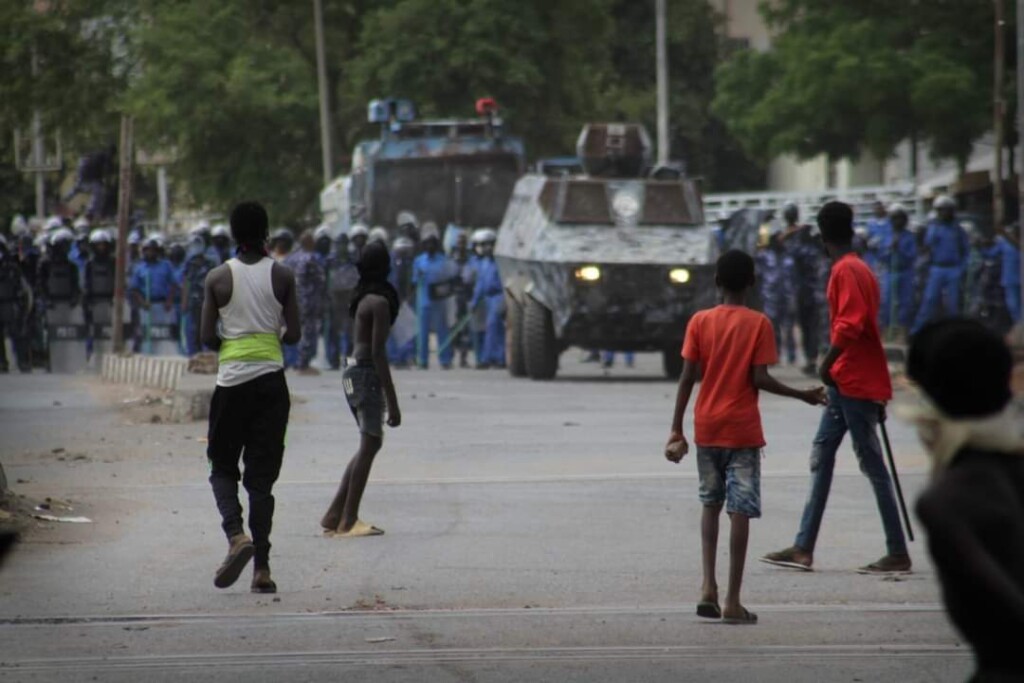Demonstrations marching through Sudan’s capital under the slogan “Overthrow the coup and settlement” were met with force yesterday, as another civil society organisation signed the initial framework agreement between an alliance of civilian parties and the military junta.
The state of Khartoum witnessed demonstrations and processions, coordinated by local state resistance committees, towards the Republican Palace. Multiple slogans denouncing and rejecting the settlement were chanted, along with calls to overthrow Sudan’s military coup. Security forces targeted protestors with tear gas at the assembly points in Basdar and El Gurashi in Khartoum.
Last week, protesters were confronted with excessive violence in Marches of Millions under the slogan "Reject the False Power" in Khartoum’s cities and Wad Madani, capital of El Gezira. Mohamed Anwar, the official spokesperson for the Khartoum Resistance Committees, stressed that the right to demonstrate is guaranteed to everyone and should count everywhere, without any demarcation of safe or unsafe locations.
The Darfuri Civil Society Platform signed the framework agreement yesterday, describing it as “a new and excellent opportunity to address and discuss Sudanese problems that have existed for decades, pave the way for future generations, and end the sharp polarisation that the country has been living through until today.”
“We must join the ranks of the civil forces and contribute to resolving the Sudanese crisis through dialogue,” the platform said in a statement after signing.
Member of the Sovereignty Council and former rebel leader El Hadi Idris on Tuesday described the framework agreement as “an important breakthrough for the crisis the country is going through that clears the way for a permanent and sustainable solution to Sudan's issues.”
On his visit to Nyala, capital of South Darfur, Idris called in a press statement on the parties that did not sign the framework agreement “to take a courageous decision to join the signatories.”
The EU Ambassador to Sudan Aidan O'Hara renewed the European Union's welcome to the political framework agreement yesterday, then announced a governance package of 15 million euros for three specific areas in 2023 in Sudan. This includes 5 million euros for the protection and advancement of human rights in the country.
Positions on agreement
Most of Sudan's resistance committees have been against any form of collaboration with the military institution since the coup d'état in October 2021. Many families of martyrs and pro-democracy protesters killed by security forces also fear an agreement that might allow the military to escape accountability.
Other civilian organisations are pushing for “all forces to sign the framework agreement in order to implement the Juba Peace Agreement, which will allow the displaced to return home.” Awatef Abdelrahman, head of the Sudanese Displaced Women Network, welcomed the agreement as a step in the right direction in an interview with Radio Dabanga last week.
On Monday, in a roundtable discussion on Turkish broadcast service TRT World, Former Chief of Staff to Former Prime Minister Abdullah Hamdok, Amjad Farid, said that “a bad solution is worse than no solution because it prevents the good solution from taking place.”
“This deal came out of the exhaustion of institutional political actors, whether the Sudanese or the international community, which was pushing for a settlement, any settlement.” In this agreement, “there are a lot of flaws that will impact Sudan very badly on the long term,” he said.
The director of Justice Africa Sudan, Hafiz Mohammed, agreed that the settlement “is not optimal.” Nonetheless, “the problem with Sudan is not agreements, it is honouring those agreements,” he said. He explained that Sudan has “civilian institutions which are not able to enforce and implement the constitutions and deals,” instead choosing to “fold them on the junta.”
According to Sudanese pro-democracy political scholar El Shafie Khader Sayed, there are three main positions on the agreement in Sudan: Those who reject the negotiation process in principle; those who accept negotiation but do not accept to be merely followers of what others decide; and those who deal with the mentality of being the only spearhead to bring Sudan to a peaceful agreement.
In an article published on December 5, Sayed warned that the agreement “will remain a property for the two parties only, unless the FCC gets active in conducting a dialogue with the largest number of other revolutionary political forces to join the two signatories.”
 Protestors face security forces in Marches of the Millions on August 2 (File photo: Social media)
Protestors face security forces in Marches of the Millions on August 2 (File photo: Social media)











 and then
and then